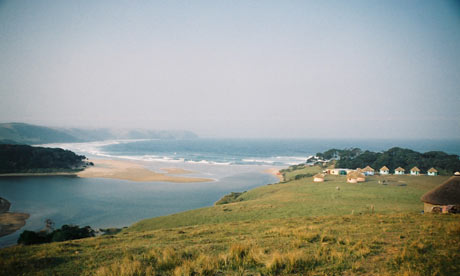
A veteran of backpacker accommodation, I'm used to the easy-come, easy-go attitude that permeates most hostels. But even I was surprised to see a donkey wander into the kitchen at Bulungula, an eco-friendly backpacker lodge on South Africa's Wild Coast. "No fences, no crime, no beggars, no hassles, just friendly smiles," it says on the lodge's website, and that policy seems to extend to the wildlife too. "He does this all the time," said Julia, banging at a frying pan to chase him out.
The brainchild of South African Dave Martin, Bulungula is a partnership between Martin and the local Xhosa community of Nqileni village, which owns a 40% stake in the lodge and is actively involved in running it. After backpacking through China, South America and Africa, Martin decided to put all his research into practice and set up his own community-based eco-hostel in his home country.
Perched on the edge of the Bulungula river where it meets the Indian Ocean, he certainly picked the right spot. With nothing but forest, fields and sea for miles, Bulungula feels like the end of the earth. Clear skies and fresh air abound, and, this being a five-hour drive from the nearest town, there's no light pollution or noise either. It's heaven.
Bulungula feels very much a part of rural village life. Locals pop in and out, tours are taken with the villagers themselves, whom you pay direct, and visitors are encouraged to learn some of the Xhosa language and wander the area at leisure, often being invited into people's huts for a drink and chat.
The other remarkable thing about Bulungula is that it is carbon-neutral. The lodge runs on solar and wind power and any CO2 emissions generated through gas and electricity usage are offset by the planting of slow-growing forest trees. Even the bread is baked in a solar oven – a huge mirrored dish that is tipped when needed to face the sun. Paper and cardboard are burned on-site (rather than driven all the way to the nearest recycling point) and all other rubbish is taken to the nearest town, Mthata. Clean water is collected from a spring or a rain tank, and all dirty water is soaked up by the surrounding banana and papaya trees, to produce fruit that is turned into smoothies using a bicycle-powered blender. The compost toilets are non-flushable, and the "rocket showers" are fuelled by paraffin. You simply pour it into the bottom of the drainpipe, throw in a handful of toilet paper, light it and voilà, you have a three-minute hot shower.
Bulungula is a collection of 10 brightly painted rondavels looking out to sea and a central living/dining/chill-out building with a kitchen, library and bar. On my first night I joined the other guests for dinner round the camp fire and got chatting to a half English, half South African guy called Allen who had given up his job as an engineer in London to help with the new eco-building for the local No-ofisi school, an hour's walk up the hill. The school is one of many community development projects started by the Bulungula Incubator, a non-profit organisation run by Dave's wife Réjane.
The next day, fortified with a toasted sandwich made with doorsteps of Xhosa bread, I took a tour of Nqileni village with local guide Lindile. Along the way we passed local women, their heads wrapped in brightly coloured scarves. "Molweni," they said, smiling softly. "Molweni," we replied, then "Kunjani?" "Ah, Ndiphilile enkos'! Kunjani?"
Those language tips written on the back of the toilet doors at the lodge are the best idea yet.
Lindile took us up to the school building project and talked us through its plans, then we joined the villagers on the banks of their newly ploughed field for some home-brewed beer, passing it around in a large tin can. We left them smoking long pipes, relaxing in the late afternoon sun.
My second day was spent with a woman called Khululwa Anna, who was born and raised in the village, and who showed me her daily tasks: making mud bricks, pounding maize and collecting the firewood and water, which she taught me how to carry on my head. She was saving the money earned from the tours to pay for a college course in nursing.
That night, after dinner, an Afrikaans guy took a huge burning log out of the fire pit, threw it into a wheelbarrow and announced he was lighting a fire on the beach. We followed him down the track and spent the evening around a huge fire on the sand, listening to Allen play the drums and losing count of all the shooting stars.
The embers of the fire were still glowing pink in the morning as I slung my bag into the car to begin the long journey back to civilisation. Out of the corner of my eye I spotted the donkey. He was standing on the beach in the middle of the fire pit, without a care in the world.
I looked around to see if anybody else thought this strange, but nobody seemed to mind. Maybe he does this all the time. Maybe it's his way of keeping warm. And after three nights here, a donkey in the fire seemed a completely natural sight to me too.
• South African Airways (0871 722 1111) flies London-Johannesburg from £664.90 rtn inc taxes. Bulungula Lodge (+27 47 577 8900): dorms from around £9 per person per night; triple/double rooms £30/£23; luxury safari tents with bedding £22 (sleep 2).

